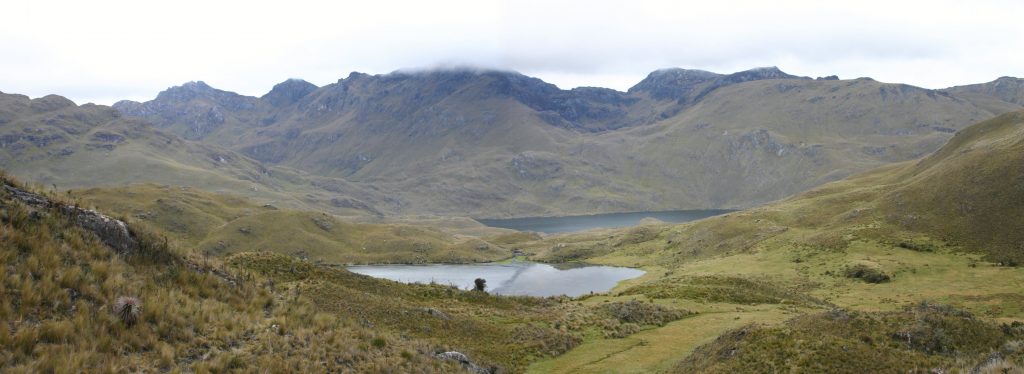
by Tristan Partridge
In early May, Ecuador’s National Assembly voted to declare June 23rdDía Nacional de los Páramos, or National Páramo Day. This designation at once recognizes the importance of these high mountain grasslands and underscores the need for improved conservation efforts. Indigenous and rural communities across the highlands have long fought to protect the páramo, but for many years such actions were localized and bereft of resources. The institutions may finally be listening.
While the special observance is of national scope, the páramo’s well-being, now and in the future, is a global concern.
High-altitude páramo moorlands comprise a wetland ecosystem that spans over 30,000 km2 of the northern Andes. Its unique soil structure and plant life play vital roles in the hydrological cycle, providing up to 85-90% of all drinking water in Colombia and Ecuador. The páramo functions by gathering rainfall and cloud moisture, which is then filtered through damp soils and slowly released into streams and rivers. Ultimately, it is a source of the greater Amazon watershed.
An estimated 60% of all páramo flora is endemic, meaning that most of these life forms are not found anywhere else on Earth. Ecuador, by virtue, is one of the world’s most megadiverse countries. Healthy páramo lands thrive on biodiversity and feed South American waterways, thereby supporting the vast forest ecosystems that sustain the planetary web of life as we know it. Indeed, the very ecosystems that are increasingly under existential threat from agricultural and industrial activities.
According to Luis Pachala Poma, the Representative who proposed the legislation, National Páramo Day is a time to celebrate the “cultural, ecological, economic, and historical importance” of this biome. June 23rd was selected because, on that date in 1802, the renowned naturalist Alexander von Humboldt and his team set out to climb Ecuador’s Chimborazo summit, at the time thought to be the world’s tallest mountain. The trek informed Humboldt’s “Essay on the Geography of Plants” and the accompanying “Chimborazo Map.” Illustrating the connections between climate conditions and plant distribution, the latter emphasized for his audience the dynamic interconnections that link overlapping natural processes. Humboldt studied the extreme meteorological conditions and physical diversity of tropical mountains, together with the multiple adaptations found in their flora and fauna. Embodying these characteristics, the páramo is now an ideal place for studying climate change.
Climate change and the páramo: critically important and critically at risk
The páramo acts as a carbon sink, supremely important in helping to limit global warming. Because páramo lands are found above the tree line, cool and wet climate conditions have allowed their volcanic, water-rich soils to store enormous quantities of organic material. Coupled with tall-growing vegetation, this means the páramo holds more carbon per hectare than tropical lowland forests.
At the same time, global warming is changing the páramo. Two particular impacts of climate change—increasing average temperatures and changing precipitation patterns—disrupt the páramo’s unique vegetation and soil characteristics. The result presents a grave threat to the ongoing existence of these ecosystems.
The wider region where the páramo is found is particularly at risk, for the tropical Andes are warming faster than anywhere outside the Arctic Circle. Glaciers are melting; less rainfall is reaching high-altitude areas; wetland plants in the páramo are dying, among other effects. If National Páramo Day can help draw attention to these changes and lead to greater support for community actions that challenge destructive industrial activities, then the event cannot come soon enough.
Representative Pachala also stated that National Páramo Day will reaffirm the need to conserve, restore, and use Ecuador’s páramo in a “sustainable” way. That idea is still deeply contested.
Ecuador’s economy continues to rely heavily on extractive industries. These industries have devastated Indigenous communities in Amazon regions, damaged biodiverse landscapes, and now, as a result, are facing increasing opposition from the population at large. In a February referendum in Cuenca, the third largest city in Ecuador, over 80% of the electorate voted to ban mining in the area, including in the Quimsacocha páramo. Yet mining companies with interests in the region have said they will not respect the referendum results.
While the newly-elected President of Ecuador, Guillermo Lasso, is associated with pro-mining policies and statements, environmental coalitions plan to keep up the pressure to ensure he honors a pre-election pledge to ban open-pit mining. Further political changes since May similarly suggest that Ecuador is on course to revise its relationship with extractive industries. The President of the National Assembly, Guadalupe Llori, is a member of the Indigenous political party (Pachakutik) and has herself faced persecution for participating in protests against oil companies. It remains to be seen whether and how the new legislature transforms Ecuadorian environmental policy.
While policy decisions are debated, those fighting to protect the páramo are among the first to point out that there is no sustainable mining. Many argue that the only “sustainable” future involves a political-economic system that looks beyond mineral extraction and, instead, protects Indigenous rights and the Rights of Nature, as recognized in the 2008 Constitution of Ecuador—the first in the world to do so.
Indigenous leader Marisol Copara has worked to protect the páramo as a source of water not only for humans but also for crops and animals. Describing the páramo as a “source of life,” Olmedo Iza Quinatoa of the Kichwa Indigenous nationality emphasizes the spiritual importance of the páramo, alongside its carbon-storing and water-giving properties, and asks, “What would our life be without water, that is, without the páramo?” The struggle for more equitable futures is ongoing.

In addition to the effects of climate change and mining, Ecuador’s páramo currently faces a number of other threats. These include industrial forestry, unregulated tourism, and land-use change as people are forced to seek grazing and arable lands at higher altitudes.
Robert Hofstede is an environmental consultant based in the capital city of Quito. For decades, Hofstede has collaborated with a network of regional scholars and activists to document biophysical characteristics of the páramo, as well as potential solutions to the changes that are placing this ‘regional biological corridor’ at risk. They note that positive steps have already been taken.
Effective measures introduced so far include water funds to recompense good practice among community initiatives and economic support for small-scale production of high-value products linked to the páramo, like alpaca wool, mortiño blueberries, organic potatoes and tubers. According to Hofstede, such programs need to be upscaled together with both a strengthened policy/regulatory framework and an improved communication/education plan. National Páramo Day can play an important part in these processes, so long as it is provided the visibility and support that these one-of-a-kind landscapes deserve.
Like all environmental campaigns, protecting the páramo is a deeply social and political project. Páramo conservation is a (pluri)national and international concern that involves the protection of biodiversity and Indigenous rights as well as efforts to limit global warming. If National Páramo Day can generate increased political and financial backing for the many local conservation efforts currently underway, it will be a success year round, for all the years to come.
Tristan Partridge is an environmental justice researcher based at the University of California, Santa Barbara (USA). His work appears in NACLA; The Revelator; Toward Freedom; and openDemocracy / democraciaAbierta, among others. More information on his academic work is available here. Twitter: @TristanPartridg.

